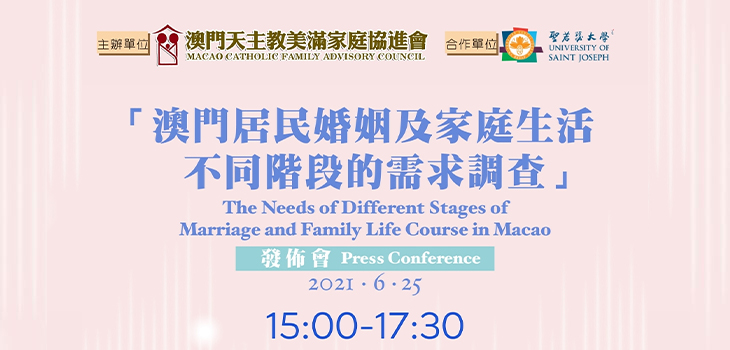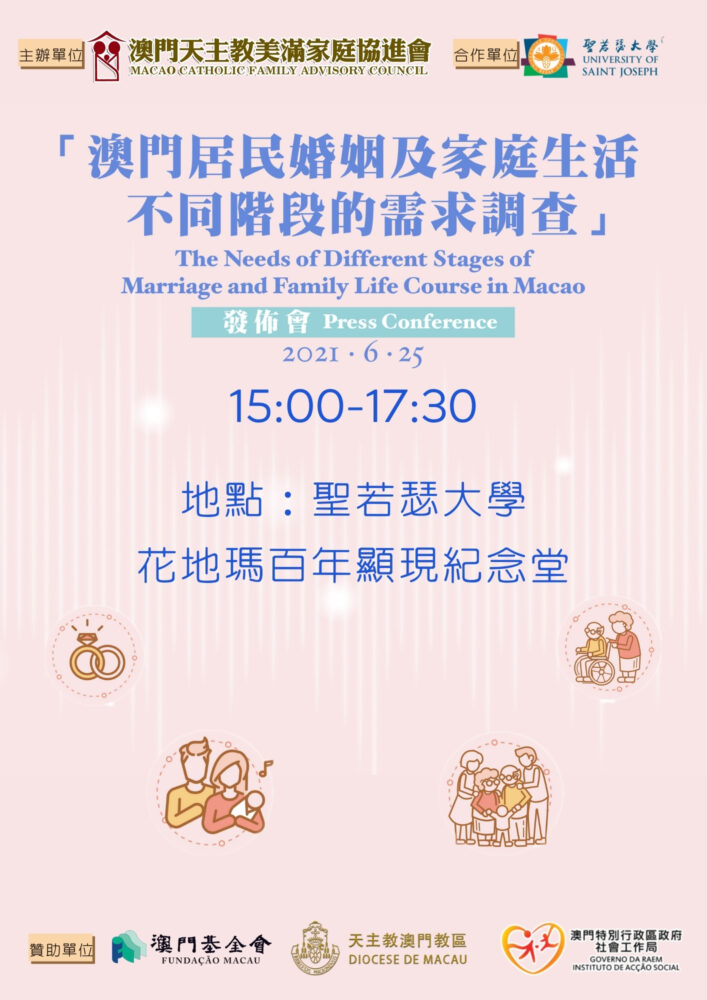Press Conference on “The Needs of Difference Stages of Marriage and Family Life Course in Macao”

Press Conference on "The Needs of Difference Stages of Marriage and Family Life Course in Macao"
25
Jun
The Press Conference: “The Needs of Difference Stages of Marriage and Family Life Course in Macao” will be held at Fatima Auditorium on 25 June 2021, at 3PM.
The year 2021 coincides with the 40th anniversary of the establishment of the Macao Catholic Family Advisory Council (MCAF).
The MCAF Association has always been concerned about family health and development of Macao citizens, therefore it conducted a survey on “Macao Residents’ Needs in Different Stages of Marriage and Family Life”, with the cooperation of the University of Saint Joseph (USJ), the Diocese of Macau and the Social Welfare Bureau; and sponsored by the Macau Foundation.
The purpose of this research is to plan and design social or pastoral services to meet the needs relating to a healthy family life. In addition, the findings of this study provide suggestions and directions to design family life education, premarital preparation and continual marital accompaniment.
The study subjects were the service users of Macao’s seven social service agencies with close cooperation. The agencies, mostly situated in the communities with dense population, mainly serve teenagers, children, families and the senior group. Besides, casino workers and parents whose kids study in primary or secondary schools, kindergartens or nurseries were also involved in the study. Finally, total 1,006 valid questionnaires were collected and analyzed by dioceses in Macao Peninsula and Taipa.
Shu Wen Liu, associate professor of Department of Social Work of USJ, noted that the research had studied the needs and crisis tasks of Macao family life at different stages from the perspective of society and religion. The study showed that women took more crisis tasks in different stages of family development. In terms of taking care of children, women devoted more time than men. When children entered adolescence, family relationship would be affected. Contrariwise, inequalities were found in the housework division between men and women. The study, trying to help women voice in family, suggested women be given chances to express their difficulties and needs. What’s more, the study also suggested strengthening the participation of men in housework and parenting. To foster fathers’ education and care for their kids, the study has provided them with more diversified and characterized support services that help them realize a father’s role and functions and develop in family so that men and women can share family and social responsibilities more equally.
Professor Liu further explained that the shift of work influenced parenting quality which would cause adaptation problems in teenagers’ growth. Meanwhile, different work and rest of life would make husband and wife lose communication and interaction, imposing negative impacts on family harmony. Therefore, more attention should be paid to strengthening the marriage relationship. Companies could encourage and promote their shift workers to take courses or participate in activities together with their spouses so as to improve their communication skills in marriage.
More than half of the Catholics were more willing to receive life education and hospice care services that were relatively lower in risk. On the contrary, only 30% non-Catholics were willing to receive life education but unwilling to talk about topics about death and hospice care because for the elderly preparing for death would bring them a lot of pressure. Even those who were considering or scheduling for death or hospice care may be forced by the reality like poor health. Therefore, it’s very important to improve the education and promotion of hospice care, making arrangements for the funeral and death education. In addition, the promotion of life education should be comprehensively carried out. It should not only focus on promoting the education of the elderly but should also be included in schools’ curriculum as it’s also urgently needed in the healthy growth of students and in shaping their life and moral values. Life education, including hospice care and arrangements for a funeral, should also be promoted from family by allowing family members to participate in the arrangements so that they could respect, admit and cherish life, and so that the traditional and modern family model could be changed.
In terms of the services of future planning for the marriage and family life, more than 60% Catholics and 40% non-Catholics took the family life education as priority. Family life education is the community education with prevention and development functions. It could improve family functions, strengthen family ties and prevent broken family through a series of educational and promotional activities. Professor Liu suggested the contents of family development include: self-recognition and self-reflection abilities; marriage relationship, strengthening of the concept of marriage, communication and interaction between husband and wife; sex life in marriage, lack of sex education and promotion of preventive work; parenting education, communication skills between parents and kids, enhancement of the interaction between parents and children; moral education of teenagers, skills to cope with social realities; adolescent rebellion, parents’ emotion management, communication skills between parents and kids; cooperation / communication between parents and schools.
Apart from that, channels for publicizing the sustainable measures of promoting premarital education, attracting more targeted audience, and caring about the using of family and marriage services of young generation. More attention should be paid to the support and service for these women before and after childbirth such as paying attention to the emotion adaptation change before and after delivery and establishing more courses related to the depression before and after childbirth.
The press conference will be held at 3 pm on June 25, 2021 (Friday) at the Auditório Centenário de Fátima in USJ Ilha Verde Campus.
Details:
Date: Friday, 25 June 2021
Time: 15:00PM – 17:30PM
Location: Auditório Centenário de Fátima, University of Saint Joseph
Seating is limited and on a first come, first served basis (free seating)










